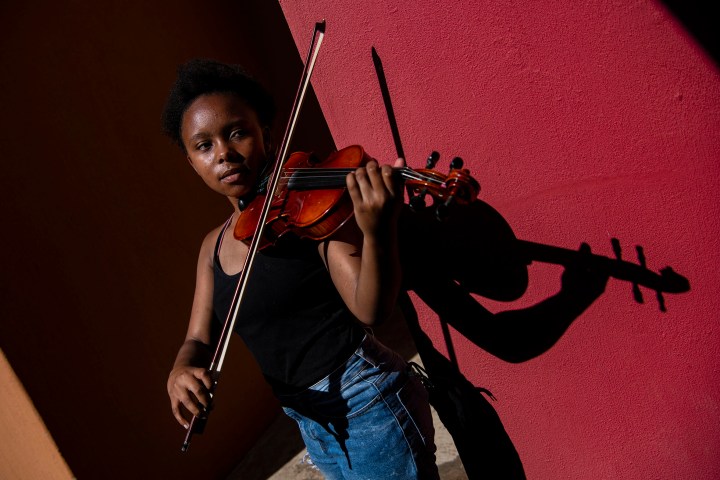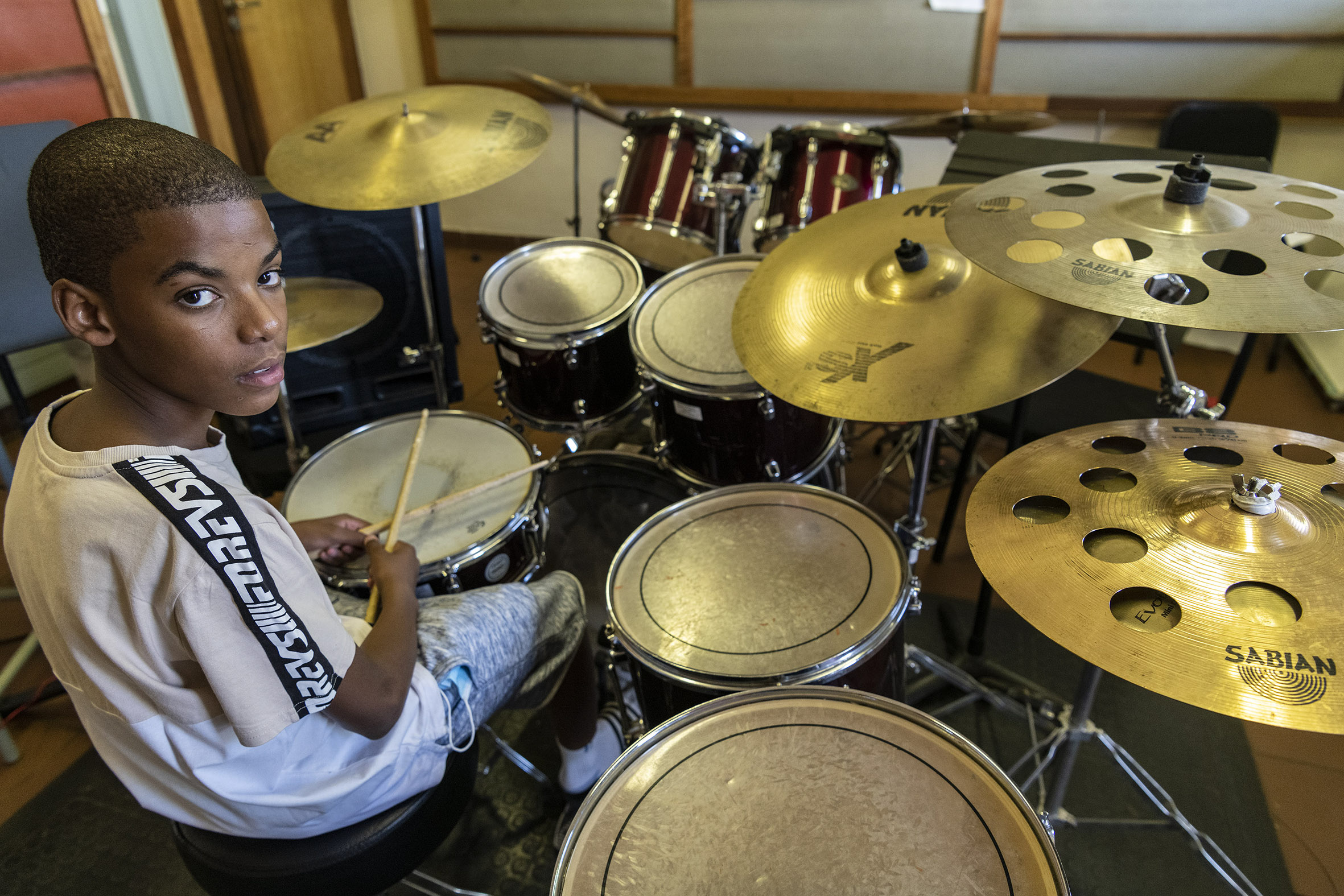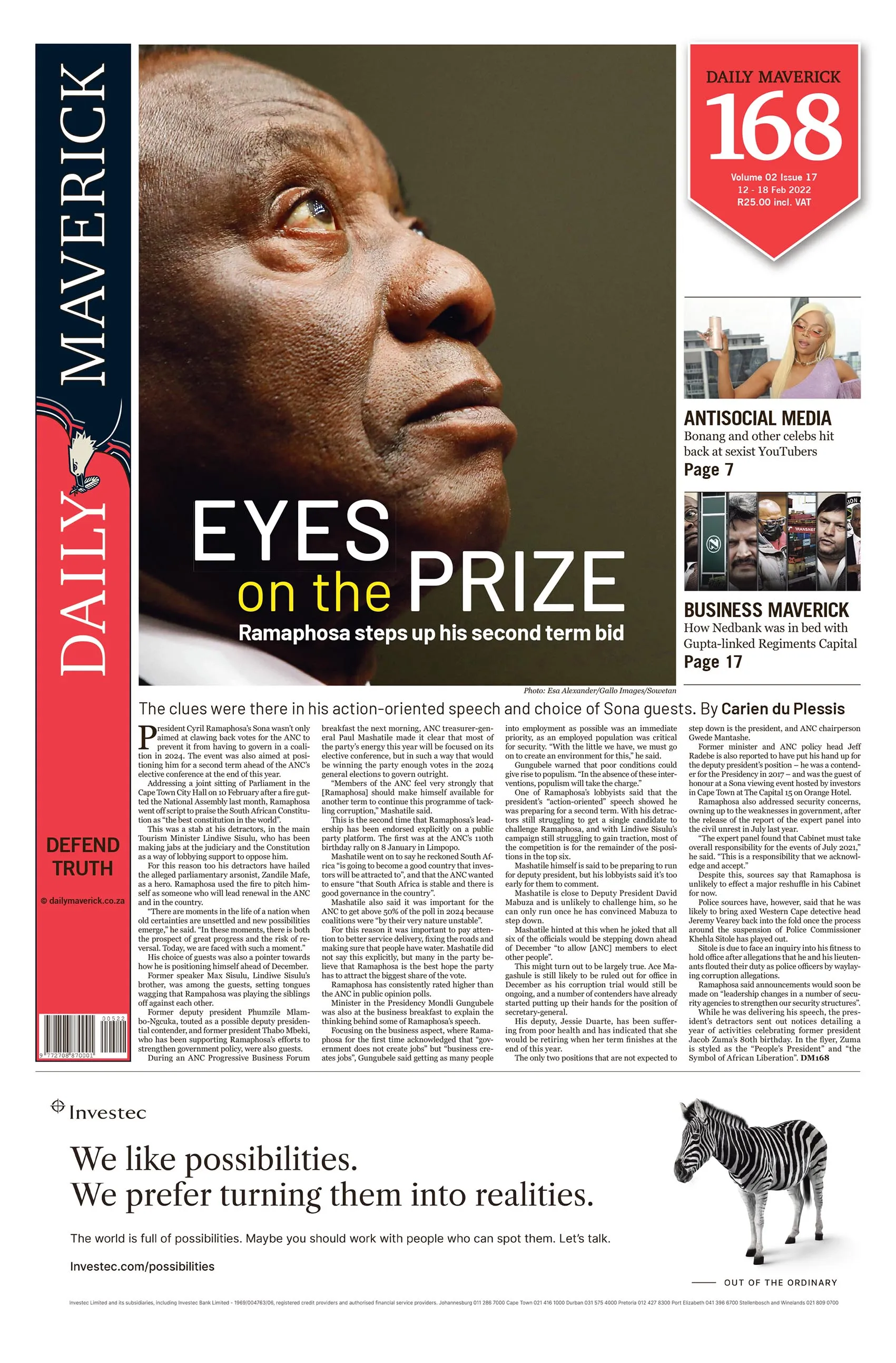NEW FRAME
Hope and play: Music centre hits the right notes for Soweto youngsters

The dedicated students enrolled at the Morris Isaacson Centre for Music are given lessons in much more than music – it is a place that ‘allows them to access their inner brilliance and their self-expression’.
NEWOn any given afternoon, a select and excited group of young people, between the ages of eight and 18, can be found in one of the rehearsal rooms at the Morris Isaacson Centre for Music (MICM). It is there that they hone their craft under the eyes of dedicated teachers.
Some of these teachers have performed on grand stages around the world. They are now giving their time to nurturing the next generation of musicians.
For Phumla Makapela, having her daughter in the centre means a chance at otherwise unattainable opportunities. Makapela’s nine-year-old, Ataahua, plays the cello.

Twin sisters Akhona (left) and Amahle Lesele practise the violin at the Morris Isaacson Centre for Music in Soweto. (Photo: Ihsaan Haffejee)
“MICM takes kids away from the streets, from just hanging around, [and] provides that awakening feeling… in terms of understanding that this small instrument, a violin that can fit in your hand, can open a whole lot of doors,” says Makapela.
Like many parents who have secured places for their children at MICM after having been on the waiting list for a long time, Makapela believes the centre gives children and young people a chance to broaden their horizons and imagine alternative realities outside their accustomed township existence.

Chris Bishop, the director of music at the Morris Isaacson Centre for Music in Soweto. (Photo: Ihsaan Haffejee)
Litha Booi (12), who has been at MICM since 2016, says: “We also come on Saturdays, when most of us are free. Coming here keeps us busy [so we are not] drawn to things like drugs.” Booi currently specialises in the djembe and drum kits.
“The centre takes our kids to the world. It takes them out of Soweto to Cape Town, to KZN… and provides intercultural learning in a musical form,” Makapela adds. She is also involved in the recently launched MICM Book Club that aims to nurture a love for reading while also helping students to develop their reading and comprehension skills.
Music and beyond
Lungile Zaphi, the director of MICM since 2020, joined the centre as an administrator in late 2018. For her, it is an important space within the community – not only because it shares a name with the historic Morris Isaacson High School, but also because of its positive contribution to the community beyond music.

Litha Booi (12) specialises in the djembe and drum kits. (Photo: Ihsaan Haffejee)
An initiative that shows this is the partnership with the South African College of Applied Psychology. The organisation offers counselling, homework help and emotional support to the students at MICM. Most recently, a community-led gardening project was set up at the centre.
MICM has not been spared by the Covid-19 pandemic, and Zaphi has had to make some tough decisions to ensure the centre’s survival. “We had to take some drastic decisions by cutting down our costs – which means cutting down people’s salaries – because we wanted to preserve the little that we have,” she says.
A key part of those survival strategies has included being “creative about what we do and how we can use music as a tool for change”.
This has seen the strategic alignment of MICM programmes with those of corporates and other organisations at a time when many are cutting down corporate social investment support and redirecting finances towards Covid-19 mitigation efforts.
Chris Bishop, MICM’s director of music, says that practical ability and theoretical-literacy understanding is prioritised and both are equally important.

Lesego Mathiane, a student at the Morris Isaacson Centre for Music in Soweto, is learning to master the trumpet. (Photo: Ihsaan Haffejee)
MICM has 116 students and offers instruction on a range of instruments, including violin, pennywhistle, djembe, drum, trombone and double bass.
The centre also works with the non-profit Ugubhu Nezinsimbi Zomculo Wesintu organisation housed on the same premises, which specialises in making and teaching indigenous instruments.
In addition to giving instruction on the playing of instruments such as uhadi, makhweyana and mqangi (bow instruments) – as well as the pennywhistle, marimba and djembe – the Ugubhu team also teaches painting, puppet-making and bead-making as part of its community outreach activities.
Leon Moloi, an external programmes coordinator at MICM, says its role is summed up in the phrase: “Youth-skills development programme through arts.”
The school’s glowing reputation has seen at least 10% of its students admitted to the National School of the Arts every year.
It has also established relationships with institutions such as the Stellenbosch University Conservatory and the Royal Birmingham Conservatoire in England. The UK institution has, since 2015, been giving lessons over Skype to 24 MICM students.
‘Catching them young’
MICM also has an early childhood development (ECD) programme, in which their teachers have been sent to places such as the Rebone Botshelo Children’s Centre daycare and preschool to teach children music skills.
With their “catching them young” mantra in place, MICM ensures that ECD centres in and around Jabavu and White City in Soweto benefit from their expertise.

Cello teacher Daliwonga Tshangela with one of his students in a one-on-one session at the Morris Isaacson Centre for Music in Soweto. (Photo: Ihsaan Haffejee)
Theresa Mbatha, who runs the ECD programme and the beginner’s basic music theory class, says: “Music is the only subject where all four parts of the brain function at the same time. While you are reading, you are playing, and you are singing and thinking of the interpretation.”
For 16-year-old Mbali Patho, who started playing the violin when she was eight, it was the sounds of a popular musician that sent her running to MICM with a burning desire to learn to play a musical instrument.
“When I first came to this centre, it was when Zahara was very popular and I decided I wanted to play [the] guitar. I was hoping to be the next Zahara, but I found out that [the] guitar class was already full,” says Mbali.
She then took up the violin – and it has enabled her to perform at festivals as well as travel to the UK.
Cello teacher Daliwonga Tshangela has been with MICM from the beginning. Robert Brooks – who co-founded the centre with late philanthropist and Cape Gate chairperson Mendel Kaplan – invited the musician to teach there. Tshangela had trained in Diepkloof under Kolwane Mantu, founder of the African Youth Ensemble.

A youngster shows off his skills on the djembe at the Morris Isaacson Centre for Music in Soweto. (Photo: Ihsaan Haffejee)
In an area such as this, “this becomes the only other world into something that is non-academic, but it allows them to access their inner brilliance and their self-expression, which is critical to the development of children and young people”, Tshangela says.
As centre director, Zaphi thinks “it is important for the government to understand the importance” of the arts so they can adequately support initiatives such as MICM.
There is something special happening at MICM. Having spent some time there, you can see that they are bringing to life their motto of “human development through music” and truly affecting the lives of young people as well as the wider community they serve. New Frame/DM168
This article was first published by New Frame, and appeared in our weekly Daily Maverick 168 newspaper which is available for R25 at Pick n Pay, Exclusive Books and airport bookstores. For your nearest stockist, please click here.





















Comments - Please login in order to comment.